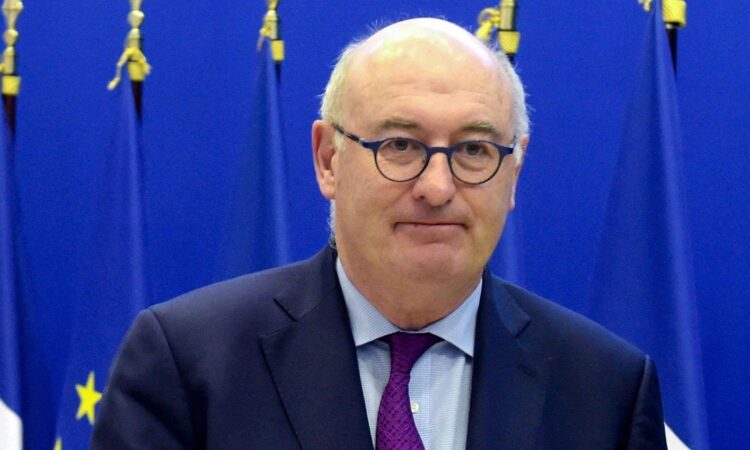‘Clouds gathering’ – Phil Hogan warns of recession and says more competition for mortgages needed in Irish market

A single European financial market would give consumers greater choice and cheaper borrowing rates, he added, as the former Fine Gael minister warned government spending would be threatened next year.
“The clouds are gathering. Germany is in recession and we are going to be in recession in the European Union or at least flat in 2024,” Mr Hogan said.
“That is not a good backdrop towards getting the economy going or getting the stimulus going and keeping people’s confidence there to buy property.”
Ulster Bank and KBC exiting Ireland has given AIB and Bank of Ireland a stronger grip on the market here. Some experts have warned a lack of competition could result in customers paying more for mortgages and loans in the long term. Speaking at the Institute of Professional Auctioneers and Valuers (IPAV) European valuation conference in Dublin last week, Mr Hogan said consumers and businesses need competition.
“I wonder when are we going to get a real, true, European sense on services, particularly financial services where we can actually implement the single European Act and have a single market in relation to financial services. Where you can shop around for your mortgage at more competitive interest rates and more competitive prices around the European Union, rather than being in a financial straitjacket in Ireland where we don’t have competition if we are honest about it,” Mr Hogan said.
“That, I think, is the fundamental principle in Europe and our challenge for consumers and citizens is how can we have genuine competition in their interest to reduce costs and make sure people have options rather than being in a straitjacket.”
Mr Hogan predicted government spending would be reduced next year because of increasing pressures arising as a result of the wars in Ukraine and the Middle East, and changes in the EU. He said Ireland must be alive to a rapidly changing European economy.
“The spending spree that we had in the last few years in terms of dealing with Covid is coming to an end. Therefore, we will have less current spending, more loans and fewer grants and there is going to be a reform of policies, especially spending policies over the next couple of years.”
He predicted these changes will result in the Government making fewer grants available and businesses becoming more dependant on low interest loans.
Mr Hogan served as European Agriculture Commissioner between 2014 and 2019 before taking on the Trade portfolio. He was forced to resign a year later in light of his role in the Golfgate scandal and now runs a consultancy firm. It recently declared annual revenues of around €1m from clients including Visa, Vodafone and JP Morgan.
The expected enlargement of the EU — with Ukraine and states in the western Balkans expected to become members — will impact how money is distributed to European programmes.
Mr Hogan also suggested the European Green Deal, a suite of policy initiatives aimed at making the EU carbon neutral by 2050, will take longer and be more expensive to deliver than initially envisaged. He pointed to Green Party losses in elections in Finland, Sweden and Luxembourg as a sign voters are concerned about the cost of environmental initiatives.
“I think it is going to take a bit longer than people thought and it will be more expensive than people thought. Technology needs to come into play in order to reduce costs and have more competition.”






